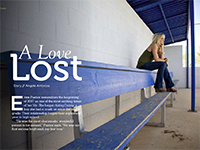 Erinn Pushor remembers the beginning of 2007 as one of the most exciting times of her life. She began dating Danny Pasenella, a boy she had befriended and had a crush on since eighth grade.
Erinn Pushor remembers the beginning of 2007 as one of the most exciting times of her life. She began dating Danny Pasenella, a boy she had befriended and had a crush on since eighth grade.
Their relationship began their sophomore year in high school. “He was the most charismatic, wonderful person to be around,” Pushor says. “He was my first serious boyfriend, my first love.” Pasenella played on his high school baseball and football teams and was popular among his peers.
Pushor says she was surprised when he first asked her out. While she had steered clear of drugs, Pasenella had a reputation of smoking marijuana in middle school and doing cocaine and prescription drugs in high school. In 2006, his parents sent him to a Utah behavior modification program for nine months to help him break his drug addiction.
“When we started dating, he was completely sober and I was 100 percent under the impression that he was clean,” Pushor says.
In March 2007, Pasenella’s brother found him lying unconscious on his driveway after a heroin overdose. That was the first time he tried black tar heroin – a cheaper less-refined heroin from Mexico – and it nearly cost him his life.
Weeks later, when Pushor found out her boyfriend was doing drugs again, she felt angry and deceived. “I was shocked and I broke up with him. I was not dating a heroin addict.” Pasenella pleaded with her to get back together and promised he would never do it again. Pushor believed him and they started dating again. “I was in love and I was so naïve,” she says.
In the fall, Pasenella returned to playing football at Valley Christian High School and appeared to be drug-free. Pushor recalls picking him up from football practice on Sept. 21st and driving back to his house. It seemed like just another relaxing evening hanging out together and doing homework. When Pushor returned home later that night, they talked on the phone for awhile. The couple was in a comfortable routine of calling each other right before bed and talking until one of them dozed off. Pasenella fell asleep first that night.
The next morning when Pushor was getting ready for school, she checked her cell phone and noticed she had missed two calls from Pasenella’s parents. She immediately knew something was wrong. When Pasenella’s father had tried to wake up his son for school, he was unresponsive, covered in vomit and his face was blue. His cell phone was laying on his head.
“I went to the hospital and he was already dead. His body and face were a very pale white,” says Pushor, who started vomiting after viewing his body. The autopsy would later show that Pasenella died from a black tar heroin overdose.
A week later, the family held the funeral service at Cornerstone Church in Chandler. Pushor helped pick out her boyfriend’s gravesite, casket and the clothes he would wear at the funeral. She chose the blue polo shirt he wore on their first date only nine months earlier. Trembling with anxiety and grief, she stood up in front of more than 1,200 people to give his eulogy. The church was packed with Pasenella’s baseball and football teammates.
“Losing him changed my life forever,” says Pushor. “I lost so much weight and my hair was falling out in chunks. For a long time I just felt so lost and so alone. My best friend, the love of my life, was gone, and I had no idea what to do with myself.”
A few months later, Pushor attended a drug awareness presentation at Horizon High School that would change her life. Afterwards, she went up to meet the speaker, Stephanie Siete, from Community Bridges, an Arizona non-profit organization that provides substance abuse prevention and treatment services.
The two women instantly connected and Pushor began working with Siete to help educate young people about the dangers of drug and alcohol use. She helped Pushor channel her grief and anger in a productive way, encouraging her to start her own anti-drug club at Horizon. Pushor also joined the Northeast Valley Coalition against Methamphetamine and hosted community events at her school. In 2008, she received the “Drug Free AZ Inspiration Award” from Cox Charities.
“It was the only way I knew how to deal with my grief, and it was an outlet for me that was positive and healthy,” says Pushor. “If I could help one person, it was worth it. I just wanted to give meaning to Danny’s death.”
Today she remains committed to helping kids learn from Pasenella’s mistakes. Last spring, she and Siete teamed up and gave drug awareness presentations at 20 middle schools in the Phoenix-area. “It’s really exciting because I’m getting paid to do what I love,” Pushor says. In addition to working for Community Bridges, she is studying elementary education at Arizona State University.
“My goal is to empower these kids to respect themselves and care about themselves enough that they want to make healthy choices, so they can have the future that Danny never got to have,” says the 20-year-old.
When talking to young people, Pushor warns them of the highly addictive power of drugs. “I don’t believe, really, that Danny was at a point where he had a choice . . . like that night that he used (black tar heroin) and died. I don’t think that was a choice – he was already addicted. But he had a choice the first time. That’s the only time you have a choice.”